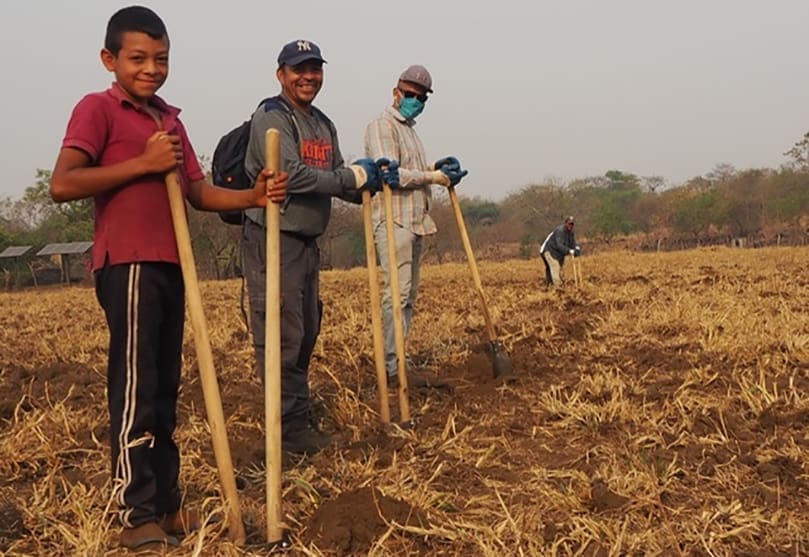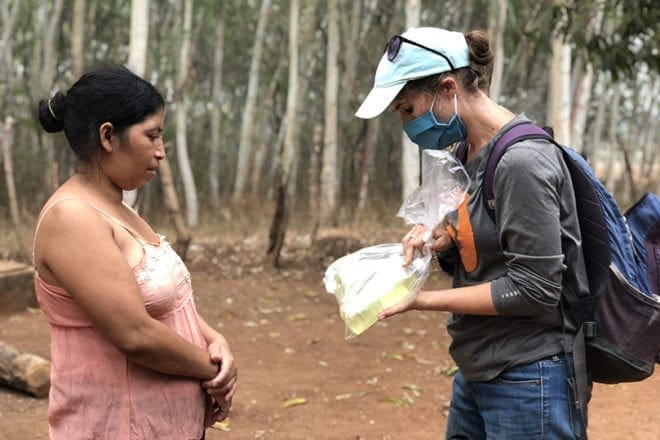 Photo Courtesy of Amigos for Christ
Photo Courtesy of Amigos for ChristBuford
Georgia-born nonprofit labors with Nicaraguans to improve conditions
By PRISCILLA GREEAR, Special to the Bulletin | Published June 11, 2020
BUFORD—Amid the coronavirus pandemic, Georgia-rooted Amigos for Christ nonprofit has cancelled approximately 30 spring and summer mission trips for teams from across the United States to serve the poor of Chinandega, Nicaragua. Yet building on its over 20-year development labors in the Americas’ second poorest nation, it has plowed ahead in a door-to-door campaign to help vecinos (neighbors) of 21 communities to stay safe.
There were 35 official coronavirus deaths in Nicaragua as of May 26, and Chinandega still confronts the outbreak of severe respiratory disease widely believed to be COVID-19. In up to 100-degree heat, masked Amigos for Christ health promoters visited rural homes during a two- week period to deliver some 8,000 Nicaraguans starter “sanitation packs” of masks, antibacterial soap, hand sanitizer and bleach, stopping at fenced property lines and spraying down the packets with alcohol. They explained prevention practices, as many in the region lack information and electricity. Testing is only available three hours away in Managua.
“We’re not able to do house visits for community water systems for bathrooms because of the close contact so we decided the most important thing we can do for help is get supplies in the hands of the community members” and Chinandega’s España Hospital, said Amigos for Christ executive director John Bland. “Over the years we’ve gained a lot of trust with the community members, and during a situation like this trust is huge.”
Amigos engages supporters virtually to offset its anticipated 30 percent income loss for 2020 including through interactive calls with cancelled mission teams. In addition, “we’ve been doing our podcast live on social media and that’s been a great way to connect with people,” said Kristin Sutton, chief operating officer in Buford, Georgia.
A recent podcast featured a woman, Reyna, whose husband Baudelio donated land for the Espabel community well and tank inaugurated just after he died of kidney disease, which clean water can prevent.
“He was a major influencer in rallying the community to work on the water system. …Reyna is a very inspiring woman and carries on Baudelio’s legacy.”
Sutton is grateful for the American support for Amigos’ mission to enable them to continue operations.
“We continually get to see people coming together to help each other and to share the love that God put inside each of us,” she said.
Working for the future
Board chair Craig Merrigan of Canada is also grateful to help lead Amigos through the pandemic while working to develop the next generation of organizational leaders.
“Amigos is a family everyone would like to be a part of,” he said. “It’s a privilege to be a small part of such a meaningful, impactful and joyful organization.”
He affirmed that the roughly 125 employees of the “amazing Amigos team” will keep their jobs. Additionally, “we continue to engage with our scholarship students, drill wells, assist farmers in enhancing crop yields and serve others in innovative ways during this unusual challenge.”

Amigos for Christ worker Taylor Crossman, at right, delivers a sanitation pack to a Nicaraguan neighbor in a rural community amid the coronavirus outbreak. In a two-week effort, thousands of packs were delivered including items such as soap and bleach. Photo Courtesy of Amigos for Christ
Amigos has distributed MannaPacks provided by Cross Catholic Outreach in local hospitals and the 21 schools they support, which remain open. They provide material support to neighborhood Our Lady of Pilar Church, facing acute financial hardship. Bland explained that in Nicaraguan society, “quarantine is impossible” as most people don’t hold nine to five jobs but must work to survive. Compounding the suffering, those dying of respiratory symptoms are being quickly buried, leaving families unable to gather for traditional mourning rituals.
“There’s a big outbreak right here in Chinandega, the health system is struggling mightily to handle this. You see the same thing you see everywhere else—the older more vulnerable people are suffering. Here in our neighborhood we’ve had at least eight people die,” said Bland.
But Amigos perseveres in the launch of their new 1 Manzana Project to help farmers transition from traditional corn farming to year-round certified organic farming of dragon fruit, citrus, avocado or honey, which can produce for at least 30 years without replanting. The project in partnership with Cross gives farmers solar powered irrigation for year-round farming on each manzana (1.75 acres), technology access and farming management software, agricultural engineering support and a $10,000 line of credit for five years at no interest.
Sutton explained that this can help small scale farmers break the debt cycle that comes from taking out high interest loans and relying on the rainy season. While farmers typically make $300 a year per manzana of corn, the new project sets a goal for the farms to produce $3,000 per year in profit by the sixth year and be debt free.
“It’s essentially a long-term effort to help small farmers in providing the capital and expertise to make his farm ten times more profitable over the course of six to 10 years,” added Sutton. “Clean water and food production are so important at this time as the economy is somewhat unpredictable.”
This spring Amigos has labored on 22 farms at safe distances to pilot Manzana, planting 30,000 vines of dragon fruit and drilling 10 irrigation wells. As Bland farms alongside Nicaraguans, he also plants seeds of hope for the future.
“They are super excited and they become employers, a big part of the community employment,” he said. “So somebody with 10 manzanas they’re looking at employing 15 people from their own community to run that farm so it’s a complete win-win,” explained Bland, while drinking his farm-to-kitchen mango papaya smoothie during a Zoom meeting from Chinandega. “Farmers just live the soil… It’s turning conversations back to what their farm is going to look like in the next three months, six months, giving them a positive vision.”
Amigos has come a long way since Bland, a former software engineer, established the nonprofit in 1999 as an outgrowth of a mission trip from Prince of Peace Church in Flowery Branch. It has worked in development ever since, including the construction of some 200 wells and 1,000-plus modern bathrooms.
“Proper sanitation and modern bathrooms are the biggest health changers,” he said. “All the time we noticed that our economic development programs were inching people forward but we wanted to see a greater impact …. So, this project is different from anything we’ve ever done because it’s a much bigger and riskier venture but has the potential to be like water and bathrooms on the economic scale.”
They also strive to encourage others day by day, whether helping a farmer plant his mango tree or listening to a Nicaraguan mourn a loved one’s death to COVID-19.
“To me that is the biggest demonstration of what Jesus asked us to do, to love the people right in front of us. And so by doing that it feels good, it feels right. At the end of the day when we hear a farmer talk to us about what it meant for us to be out there with him, I swear it’s like God reaffirming what we’re doing,” reflected Bland. Amid the fear and uncertainty, “at Amigos we try to be the best light we possibly can to everybody.”